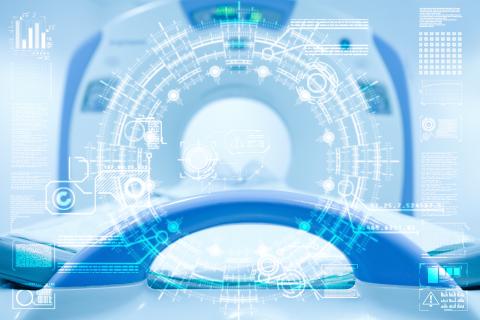
Raidium: AI to assist radiologists
With ChatGPT, artificial intelligence (AI) has taken a giant leap forward and won over the public, who are fascinated by this new tool. Inspired by this model, start-up Raidium aims to develop an AI capable of assisting radiologists with disease detection. It is a complex task, but one that could save lives. Focus on this young company.
A new generation of artificial intelligence (AI) has emerged in the early 2020s and a paradigm shift in machine learning is taking place. Pierre Manceron, an alumnus of CentraleSupélec and ENS Paris-Saclay, and radiologist Paul Hérent both work for Owkin, a medical technology unicorn. "We told ourselves that this start-up did not have enough to do with radiology, and I didn't want to change jobs. Pierre was curious about these issues, and there was a convergence of interests," explains Paul Hérent. They then took advantage of the appeal of AI to embark on the adventure of creating a start-up specialising in radiology. By October 2021, they were working on their start-up full-time and officially founded Raidium in January 2022.
Combining image and text
Today, radiologists can run up to six scans an hour, whereas 40 years ago, a single scan took half an hour. While image generation times have accelerated significantly, analysis times have not. Doctors find themselves dealing with six cases an hour. "What we are looking to do is speed up radiologists' analysis time using an AI model," adds Pierre Manceron. Doctors already have voice-recognition algorithms for dictating reports. The co-founder continues, "We want to invent new interactions with AI to make their work easier. This would involve, for example, directly generating the radiology report and detecting anomalies in the images, but always under the doctor's supervision. There are many elements that a radiologist cannot study, such as volumes (size of organs, tumours, etc.). The specialists have a very high mental workload, as the amount of data to be examined is huge."
Raidium members use foundation models to achieve their goals. "These are unsupervised learning models with billions of parameters. These programmes assimilate their learning using a very large amount of data, and have the ability to combine different types of information, such as images and text," says Pierre Manceron. In medical imaging, a text accompanies and describes the images to provide a broader medical understanding. Synergistic AI learning ensures a better learned representation of the data and very high accuracy. However, this AI is very complex to set up and train.
A versatile product
"We have collected a lot of information and reached a point where we need to demonstrate our product and give shape to our vision," says Paul Hérent. This is why the co-founders put forward their model at the annual Francophone Days of Radiology on 13 October 2023. The radiologist continues, "This allowed us to prove that we can do many different and versatile things with our model." Raidium has partnered with Paris hospitals to tackle liver diseases such as portal hypertension (a major complication of cirrhosis) and Nash (non-alcoholic steatohepatitis, also known as "fatty liver disease"), which are hard to diagnose and therefore not well treated.
The product developed by the start-up would also be useful in cancer cases. When the disease spreads to several organs, analysis is complicated by the need to examine the evolution of several different types of tumour (specific to different organs in particular), and today's AIs are unable to do this. "We want to show that ours can do it," comments Paul Hérent. "We want to make an unsupervised model for unspecified use cases, such as performing virtual biopsies for Nash, non-invasively predicting invasive markers, and better assessing tumour volume in clinical trials. We want a tool to make measurement more reliable and, consequently, make research and clinical practice more efficient."
A wide range of partnerships
To complete its gigantic databases, Raidium needed to collaborate with hospitals. It has partnered with the Centre d'Imagerie du Nord (Northern Imaging Centre) in Saint-Denis (Seine-Saint-Denis). But it is also being incubated by Paris Biotech Santé at Cochin Hospital in Paris, and at CentraleSupélec, with the 21st programme. "We are particularly pleased with these two incubations, which complement each other very well and help us gain expertise in both medicine and mathematics," enthuses Paul Hérent. The start-up also receives a grant from the BPI (French Tech Emergence Grant).
In June 2023, the start-up launched its first fund-raising round, whose amount remains a secret. Various business angels, as well as a biotech fund, have contributed to financing the research. "This first round of financing has enabled us to recruit our first R&D team. There are now seven of us in the company, including six machine learning engineers whose job it will be to build the prototype foundation model. The profiles are very multi-disciplinary and all come from Grandes Ecoles," adds Pierre Manceron. At the end of 2023 or early 2024, the co-founders will launch a new fundraising round to make their prototype more accurate. They would also like to start a research project with academic partners (AP-HP in particular) as part of a CIFRE thesis.
Pierre Manceron sums up the start-up's next objectives as follows, "We are looking for partnerships with manufacturers in the pharmaceutical field, in addition to the one we already have, so that we can create a first prototype in line with our vision. We also want to set up a biomarker factory and tackle applications that are only accessible to a few specialists. The aim is to democratise radiology expertise."
